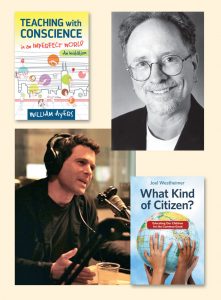Off Course: Ayers and Westheimer argue that rather than trying to be the answer, schools should focus on teaching how to question
What role should schools play in a democratic society?
Not the ones they’re playing right now, according to both William Ayers and Joel Westheimer.
Speaking in late May at a “celebration and conversation” of the books that each has recently published on this topic with Teachers College Press, the two leading scholars asserted that education in America has strayed from its historic purpose of helping to shape well-rounded, socially concerned human beings who can think for themselves.
“I think we can all agree there is a grave threat to democracy going on in our country,” Westheimer, University Research Chair in the Sociology of Education at Canada’s University of Ottawa, co-author with Dana Mitre and Stephanie Serriere of What Kind of Citizen? Educating Our Children for the Common Good. “One of the things that drove me to write this book is that we talk about schools as arms of the economy, or job training institutions, and we’ve lost the language of talking about schools in the way public education was founded in this country: to create citizens ready to participate in the democratic process. What kind of people do we want leaving the school house door? What kind of society do we want them to build?”
In answering those questions in What Kind of Citizen, Westheimer argues that schools must teach students how to ask questions; expose them to multiple perspectives and viewpoints on important issues that affect everyone’s lives; provide opportunities to analyze and discuss different viewpoints; show that “facts” are less stable than is often thought; and engage controversial issues.
Ayers (Ed.M. ’87, Ed.D. ’87), retired Distinguished Professor of Education and Senior University Scholar at the University of Illinois at Chicago, said he was motivated to write Teaching with Conscience in an Imperfect World: An Invitation as a response to the growing influence of the current education reform movement. He characterized that movement as a three-pronged effort reducing education to a single metric measured by standardized tests, “obliterating any collective voice of teachers,” and the “privatizing of a public space.”
“We’re not fighting against the corporate reformers because we think they’re bad people with horns,” said Ayers, who serves as editor of the Teachers College Press series on social justice. “We’re fighting for something, the idea that every kid in a democracy deserves a neighborhood school that is fully functioning, that embraces the kids for who they are and cares about them, that sees them as fully human.”
Ayers and Westheimer were introduced by Westheimer’s mother, the sex therapist and media personality Dr. Ruth Westheimer (Ed.D. ’70), who said, “Our schools need to do more than just pour knowledge into our children. They need to shape our children to be the best they can be in terms of their values as well as their knowledge.” The audience serenaded Dr. Ruth, an adjunct professor at TC who will soon celebrate her 88thbirthday, with a round of “Happy Birthday.”
Ayers and Joel Westheimer discussed questions posed by the audience about topics ranging from racial inequality in public education to whether teachers should freely express their own opinions on political issues. The short answer to the latter was, essentially, “it’s complicated.” But Ayers and his TC series co-editor Theresa Quinn provide a more detailed answer in their series forward at the beginning of Teaching with Conscience:
“Education is where we gather to question whether and how we might engage and enlarge and change our lives, and it is, then, where we confront our dreams and fight out our notions of the good life; where we try to comprehend, apprehend or possibly even change the world. Education is contested space, a natural site of conflict – sometimes restrained, other times in full eruption – over questions of social justice. The work, of course, is never done. Democracy is dynamic, a community always in the making. Teaching for social justice continues the difficult task of constructing and reinvigorating a public. It broadens the table, so that more may sit together. Clearly, we have a long, long way to go. And we begin.”
– Ellen Livingston

